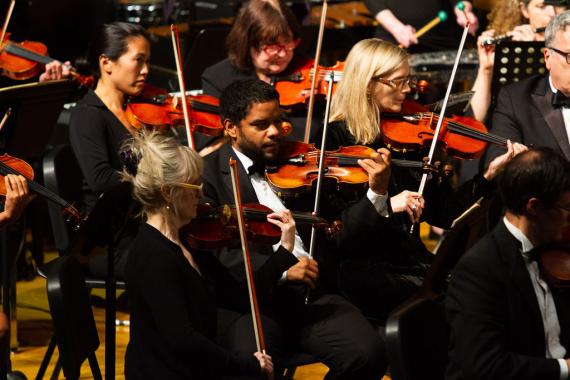Seattle orchestra Harmonia (William White, conductor) performs concerto excerpts with UW piano students.
This performance is made possible with support from the Willard Schultz Piano Fund in the School of Music.
Biography
Harmonia
Harmonia is a vocal-instrumental ensemble unique among Pacific Northwest musical organizations, combining a 70-member orchestra with a 55-voice chorus to perform oratorio masterworks alongside symphonic and a cappella repertoire, world premieres and chamber music.
Founded by George Shangrow in 1969 as the Seattle Chamber Singers, from its inception the group performed a diverse array of music — works of the Medieval, Renaissance and Baroque periods to contemporary pieces and world premieres — accompanied by an ad hoc group of instrumentalists for Bach cantatas and Handel oratorios (many of which received their first Seattle performances at SCS concerts).
A decade later, in 1979, Shangrow formed an orchestra at the request of these musicians, calling it the Broadway Chamber Symphony (after the Broadway Performance Hall on Seattle’s Capitol Hill, where it gave its first concerts). The orchestra’s name soon became the Broadway Symphony and then (beginning with the 1991–1992 season) Orchestra Seattle.
With Shangrow on the podium (or conducting from the harpsichord), the combined ensembles became renowned for performances of the Bach Passions and numerous Handel oratorios — particularly Messiah. During the “Bach Year” of 1985, the organization presented 35 concerts devoted to dozens upon dozens of Bach’s works to celebrate the 300th anniversary of the composer’s birth.
Over the past five decades, the ensemble has performed all of the greatest choral-orchestral masterpieces, from Beethoven’s Ninth and Missa Solemnis to Stravinsky’s Symphony of Psalms, Mendelssohn’s Elijah to Brahms’ German Requiem, and Haydn’s The Creation and The Seasons to Britten’s War Requiem. Meanwhile, the orchestra, partnering with world-class soloists, has explored the symphonic repertoire, programming beloved warhorses alongside seldom-performed gems. Throughout, Shangrow championed the music of local composers (in particular Huntley Beyer, Robert Kechley, Roupen Shakarian and Carol Sams, pictured below), presenting well over 100 world premieres.
George Shangrow lost his life in a car crash on July 31, 2010, an event that shocked not only our musicians and our audiences, but the entire Pacific Northwest musical community. Over the ensuing three seasons, the volunteer performers of our orchestra and chorus partnered with a number of distinguished guest conductors to carry on the astounding musical legacy Shangrow created.
A search process during the 2012–2013 season led to the selection of Clinton Smith as the group’s second music director. Clinton led the ensemble for four seasons. The 2017–2018 season brought four music-director candidates to the podium, resulting in William White being named music director and principal conductor beginning with the 2018–2019 season. White’s tenure has already been marked by several notable developments: a season devoted to the works of Lili Boulanger; the organization’s 50th anniversary celebrations; a pandemic year commissioning project; and the adoption of a new name: Harmonia.
William White
The 2025–2026 season marks William White’s eighth as Harmonia’s music director. Maestro White is a conductor, composer, teacher, writer and performer whose musical career has spanned genres and crossed disciplines. For four seasons (2011–2015) he served as assistant conductor of the Cincinnati Symphony Orchestra, working closely with music director Louis Langrée and an array of guest artists, including John Adams, Philip Glass, Jennifer Higdon, Itzhak Perlman and James Conlon.
A noted pedagogue, he has led some of the nation’s finest youth orchestra programs, including Portland’s Metropolitan Youth Symphony and the Cincinnati Symphony Youth Orchestra. Mr. White has long-standing associations with a number of musical organizations, including the Chicago Symphony Orchestra, the Pierre Monteux School for Conductors and the Interlochen Academy.
In addition, Mr. White maintains a significant career as a composer of music for the concert stage, theater, cinema, church, radio and film. His music — which includes a symphony, an oratorio, chamber music of all varieties, and several works intended for young audiences — has been performed throughout North America as well as in Asia and Europe. Several of his works have been recorded on the MSR Classics, Cedille and Parma record labels. Recordings of his music can be heard at www.willcwhite.com, where he also maintains a blog and publishing business.
Mr. White earned a master’s degree in conducting from Indiana University’s Jacobs School of Music, studying symphonic and operatic repertoire with David Effron and Arthur Fagan. He received a Bachelor of Arts in Music from the University of Chicago, where his principal teachers were composer Easley Blackwood and conductor Barbara Schubert.
